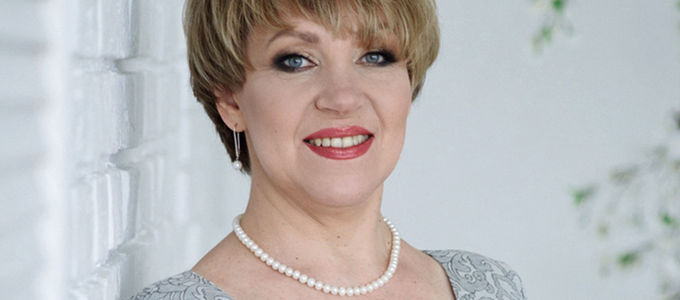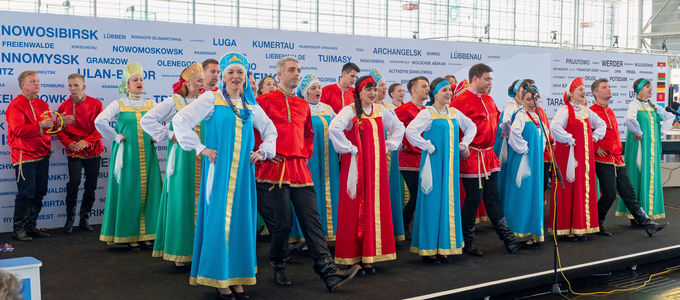
Olga Shcherban (50) is a chorus master at the Voronezh Opera and Ballet Theatre in Russia. Our sister in faith also puts her gift and her musical skills to use in her congregation and the Church.
Olga has been passionate about music since childhood thanks to her mother. The mother is a chorus master and her father played the trombone in the symphony orchestra. And so Olga attended concerts and watched theatre performances from an early age on.
In 1992 she came into contact with the New Apostolic Church. She was invited to sing in the choir at the time. Today some 30 to 35 members attend services in the congregation in Voronezh. Olga’s husband, Alexandr, is a Shepherd and is the rector of the congregation. There is a small choir that sings in the services on Wednesdays and Sundays.
Insights into a musical life and working with choirs in Russia.
When the Chief Apostle visited St Petersburg (Russia) on Thanksgiving in 2019 you directed the choir. Were you nervous?
Of course I was. That is a very big job. The choir was specially formed for this service. In addition to choir members from St Petersburg, there were also members from Voronezh, Moscow, Kaluga, and other cities.
The distance from Voronezh, where you live, to St Petersburg is 1,250 kilometres. Do you travel that far often?
No, not that often. Five hundred kilometres to Moscow, for example, is more usual.
Was it the first time that you directed such a national choir?
No, the first time we formed such a national choir was for the International Church Convention in 2014 in Munich. In the years that followed the choir sang at various Church events in Russia. This choir also performed at the 2019 International Youth Convention in Düsseldorf (Germany).
The most important thing is the sense of unity that comes about when we do music together with brothers and sisters from other cities. You are not alone! That is the most important thing!
The beautiful performance is certainly no accident, since you are a professional choir master. Why did you choose this profession?
My parents are musicians, which likely influenced my career choice. As a child I had lessons at a music school. Then, after completing music college, I decided to study at the Academy of Arts in Voronezh. On completing my studies, I was hired as a chorus master by the theatre. I have worked at the Voronezh Opera and Ballet Theatre for 25 years now. In 2016 I was appointed general chorus master.
So you work with the choir and direct it during performances. Which works are in your repertoire?
For example, the opera Iolanta by Peter Tchaikovsky, Don Giovanni and The Magic Flute by Wolfgang Amadeus Mozart. Snow White and The Night before Christmas by Nikolai Rimsky-Korsakov, Pagliacci by Ruggero Leoncavallo; the operettas The Merry Widow and The Count of Luxembourg by Franz Lehár, The Bat and The Gypsy Baron by Johann Strauss, and many others
As a professional musician, how do you deal with the fact that most of the singers in our church choirs amateurs?
It is normal that there are people with different levels of musical training in the church. Many cannot even read music. Within the church, the level of training and social status are not important. What is important is the service that is performed in the name of God.
Are there differences in how you approach conducting in the theatre and in the Church?
There is no difference. In my opinion, it is essential to always have a professional approach, also at church. The main thing is that people accept you and understand what you want to convey to them. People learn to read the conductor’s gestures during rehearsals.
Are you familiar with the following situation: someone loves to sing, but is not really all that talented. What can be done in a case like that?
I advise such people to work more on themselves, to listen to the other singers more, and to sing as part of an ensemble. And in order to hear what and how the others sing, they automatically have to sing more softly themselves. I often compare the choir to an organism. There should be no “soloists” in a choir. It is important for a choir member to seek harmony and unity. We need to listen more, and then everything will work out.
You are active on some of the Church’s music committees, which ones specifically?
When asked, I do work on such committees. I enjoy it. For example, I was on the committee that compiled the Russian New Apostolic hymnal. The work took over several years. The group, led by Apostle Sergey Bastrikov, consisted of six members. We worked intensively with the Bible, discussed how best the hymns could be translated. Then we designed the hymn collection ourselves. It was hard work, but exciting. When I look back on this time I feel great warmth. And then, at the invitation of District Apostle Wolfgang Nadolny, I gave conducting courses in Kazahkstan, and also in St Petersburg and Moscow.
What special experiences have you had as a result of your work as a choir conductor in the Church?
There are many. Thanks to my work with the choirs I can attend services conducted by the Chief Apostle. And thanks to my work with choirs, I have met wonderful people in our Church in Russia and abroad. One of the most beautiful memories I have is of the International Church Convention Munich in 2014. It seemed to me as if the whole city was populated by brothers and sisters. It was a wonderful feeling of togetherness. It was also the first time that our national choir performed and represented Russia. Everybody was nervous, our programme was varied: Russian folk songs, dances, religious hymns. The preparation was complicated and laborious, but we did it to glorify God—and we succeeded.
And what if something does not go as planned? What helps you in such moments?
Life is not always smooth sailing. But in difficult times, faith in the Lord helps. He is always there to support and help, to comfort and guide.
The interview was first published in the German magazine “Unsere Familie”, edition 1/2020.














